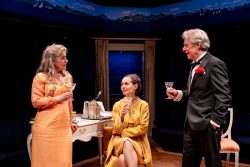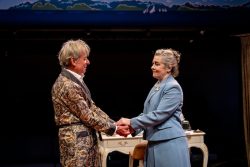 NOEL Coward wasn’t called The Master for nothing, and up until the end of his long and prolific writing career he continued to produce wise and witty plays with an inimitable style. The last of these was a collection called Suite in Three Keys, all set in the same suite of a Swiss lakeside hotel, each featuring a man and two women and a shared waiter called Felix.
NOEL Coward wasn’t called The Master for nothing, and up until the end of his long and prolific writing career he continued to produce wise and witty plays with an inimitable style. The last of these was a collection called Suite in Three Keys, all set in the same suite of a Swiss lakeside hotel, each featuring a man and two women and a shared waiter called Felix.
The plays were first produced in London in 1966, starring Coward, Lilli Palmer and Irene Worth. It was seven years before the writer died – and a year before homosexuality was (partially) decriminalised in the UK. There is one full-length play (A Song at Twilight) and two shorter ones – the wordy and serious Shadows of the Evening and the most frequently performed, the comedy Come Into the Garden, Maud.
The Orange Tree Theatre has mounted a revival, directed by Tom Littler and currently on a UK tour and in Bath until 13th July. In all three plays it stars Stephen Boxer as the husband, and Tara Fitzgerald as the temptress mistress and Emma Fielding as the deserted wife. Not only does this subtle and versatile actress have to battle the triple-underdog role, but also a wardrobe drawn from the 1960s frump selection.
Inevitably, all three plays reflect the writer’s preoccupations at the time. A Song at Twilight is all about famous English writer Hugo living with his German-born wife/translator Hilde in Switzerland when a former lover, Carlotta, gets in touch. The loyal Hilde is rightly dubious, and Hugo fears requests for money from this unsuccessful actress now living in America. What Carlotta wants is much more than cash, threatening to expose Hugo’s homosexuality to his adoring public.
 Shadows of the Evening has publisher George and Linda, his mistress of seven years, suddenly confronted with a diagnosis of an early death. Linda calls George’s wife for moral support, but George is wise to their tricks and wants instead an honest path to heaven or hell. It’s an uncomfortable watch, as the controlling George decides it is he who knows what both his women want and need.
Shadows of the Evening has publisher George and Linda, his mistress of seven years, suddenly confronted with a diagnosis of an early death. Linda calls George’s wife for moral support, but George is wise to their tricks and wants instead an honest path to heaven or hell. It’s an uncomfortable watch, as the controlling George decides it is he who knows what both his women want and need.
Coward’s knowledge of the American attitude to life is honed with humour for Come into the Garden, Maud. Verner and Anna-Mary Conklin are two wealthy American holidaymakers, and Maud Caragnani is a British Sicilian princess living in penury in Rome. She easily outshines the complaining and overbearing Anna-Mary, and before the end of the play, the philosophical Verner is heading off with his new love to a more exciting life.
There is much to enjoy about these productions, but there is also an inescapable sense of caricature which all the Master’s taut dialogue and sage sayings cannot overcome.
GP-W
Photographs by Steve Gregson